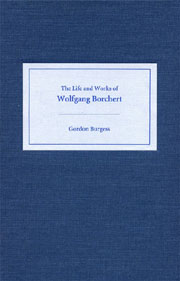Book contents
- Frontmatter
- Contents
- Acknowledgments
- List of Abbreviations
- Introduction
- 1 Childhood, School, Apprenticeship: 1921–1940
- 2 “The Happiest Time of My Life': January–June 1941
- 3 The Eastern Front and Courts-Martial: 1941–1943
- 4 Actor Turned Writer: Jena, Hamburg, and Basel: 1944–1947
- 5 The Poems
- 6 Draussen vor der Tür
- 7 The Short Stories
- 8 The Reception of Borchert's Life and Works
- Conclusion
- Published Works Cited
- Index
3 - The Eastern Front and Courts-Martial: 1941–1943
Published online by Cambridge University Press: 05 February 2013
- Frontmatter
- Contents
- Acknowledgments
- List of Abbreviations
- Introduction
- 1 Childhood, School, Apprenticeship: 1921–1940
- 2 “The Happiest Time of My Life': January–June 1941
- 3 The Eastern Front and Courts-Martial: 1941–1943
- 4 Actor Turned Writer: Jena, Hamburg, and Basel: 1944–1947
- 5 The Poems
- 6 Draussen vor der Tür
- 7 The Short Stories
- 8 The Reception of Borchert's Life and Works
- Conclusion
- Published Works Cited
- Index
Summary
Basic Training, Aranka, “Die Blume”: June–September 1941
THE NAZI-SOVIET NON-AGGRESSION PACT signed on 23 August 1939 had been seen as expedient at the time by both Hitler and Stalin. In his address to the Reichstag on 1 September 1939, Hitler announced that the pact would last “for all the future,” but in late 1940 he decided that it no longer served his purposes. The Battle of Britain had taken its toll on both the German and the British airforces, and strategically it would have made more sense for Hitler to have concentrated on weakening Britain further by increasing U-boat attacks on British shipping. Hitler did toy with this approach, but in the end decided to attack the Soviet Union, because it fitted in with his own territorial and ideological aims. The decision was to prove strategically disastrous, and to change the outcome of the Second World War. On 18 December 1940, Hitler gave the order to prepare for “Operation Barbarossa,” with a view to attacking the Soviet Union on 15 May 1941 at the latest. In the event, the German attack began at 3:30 A.M. on 22 June 1941. The attacking German army was divided into three separate groups. Borchert was assigned to Army Group Center, which made a rapid advance toward Moscow, capturing Minsk and Smolensk and stopping only thirty kilometers from the Soviet capital late in November 1941.
- Type
- Chapter
- Information
- The Life and Works of Wolfgang Borchert , pp. 57 - 90Publisher: Boydell & BrewerPrint publication year: 2003

